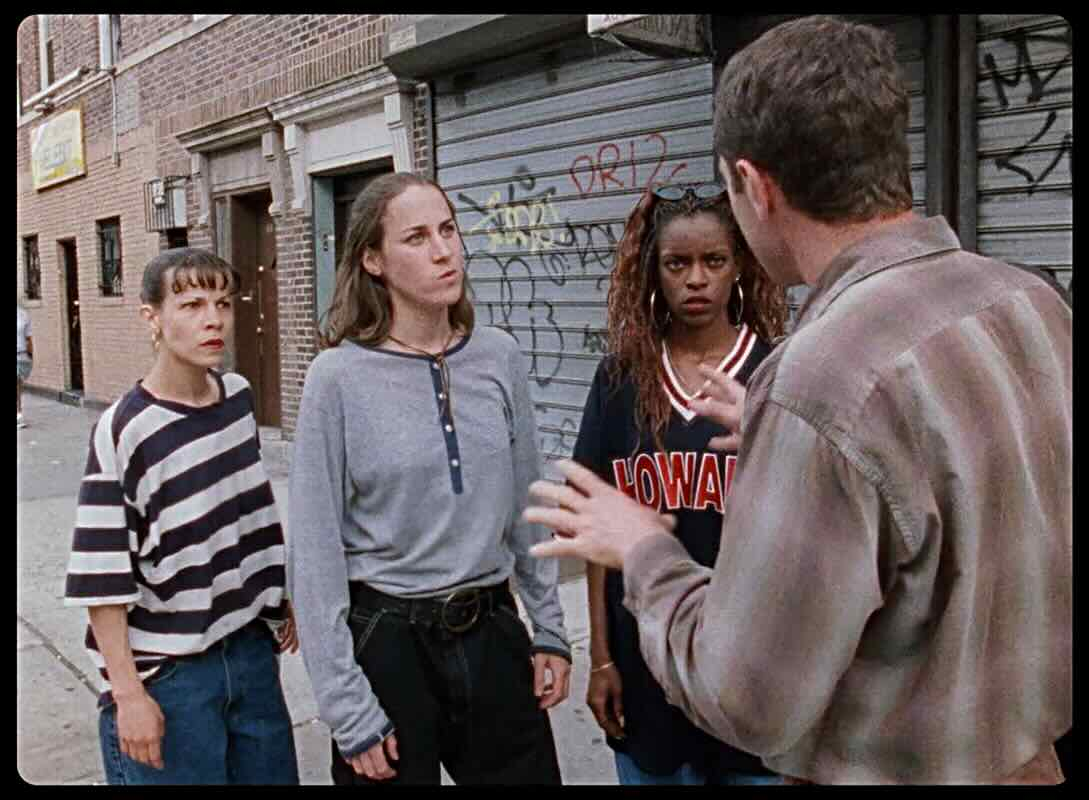
The 4K restoration of Girls Town is a real treat. Originally released in 1996, the film is a fascinating look at a bygone era as well as a showcase for then-budding talent.
The plot: four high school girls roam the halls, hang out, and ponder life at a baseball field dugout. Emma (Anna Grace) is the most thoughtful and the most grounded. Angela (Bruklin Harris) is anxious to leave home and what she sees as the control of her single mother. Patti (Lili Taylor) is scrappy and has a child, whom she asks the others to watch while she goes to class. Nikki (Aunjanue Ellis-Taylor) is brooding and secretive.
When Nikki dies by suicide, the others steal her diary to suss out the reason for her death. In an entry, Nikki has written she was raped. One by one the remaining three consider their own experiences and conclude that they, too, had been casually raped during encounters with boys. The girls don't immediately see it as a crime. Emma considers it the way boys show love; she barely registered it when necking evolved into assault. Angela sees it as the price of dating. Patti got pregnant by a local asshole and has toughened up. They squabble: "We try to talk about it and look what happens. We fight for twenty minutes!" They pledge to avenge Nikki by going gangsta, and exact revenge on the culprits.
Girls Town takes place nearly 30 years ago: pre-cellphones, pre-social media, pre-piercings and tattoos. Rap hadn't yet become fully corporatized. By today's standards, the girls are hardly vigilantes. They limit their mayhem to vandalism, writing graffiti on the girls' room walls, and lobbing insults that seem lame today ("Go read a comic book!"). The girls delight in their rebellion: Patti exclaims: "We wouldn’t have been doing this shit a week ago!" Still, the film weighs topics as serious as abortion, class ("Patti takes car shop; you've been accepted to Columbia"), the Glass Ceiling, and subverting the patriarchy.
Girls Town sides with the girls and their acts of reckoning. Compared to, say, the Michelle Pfeiffer vehicle Dangerous Minds, which was released a year earlier, they are not tamed at the end. No adults influence the girls, no one tells them to calm down. So they merrily scorch the earth in front of them. Their brushes with authority are amongst the best scenes: Patti bursts into a classroom and preempts a teacher about to announce that Nikki has died; the girls visit Nikki's mother, realizing they are unwelcome, aliens in her pristine living room.
The 4K restoration is impeccable; the colors are bright and the images sing with clarity. Girls Town is clean: that’s to say it's set in what the show notes call "urban America" (which looks a lot like Brooklyn). The streets are not very mean and the homes not very ghetto. Director Jim McKay shoots confidently, and with a distinctive style (this was his first feature). Scenes linger on the girls' conversations, the camera often peering through windows, tracking slowly as the girls debate life and their task. The screen’s aspect ratio is a tight box: the images are packed into a frame with rounded corners that resembles an old viewfinder. It makes us voyeurs and adds heft to what we're witnessing. Mr. McKay has gone on to direct episodes of The Wire, Breaking Bad, and Better Call Saul.
The actors represent a Who's Who of aspiring New York talent of the time. Lili Taylor has been in I Shot Andy Warhol, HBO's Six Feet Under, and The Conjuring. She's a regular on Amazon Prime's Outer Range. Anna Grace was in Boys Don't Cry, and Bruklin Harris in Dangerous Minds, but both their IMDB credits stop around 2002. Aunjanue Ellis-Taylor as Nikki has had a long run and is currently in Nickel Boys. Look for Michael Imperioli and John Ventimiglia, two Sopranos alumni, in small roles. Guillermo Diaz has a cool turn as Emma's concerned boyfriend Dylan.
Girls Town is released by Film Movement, a force is the distribution of independent and foreign cinema.
_____________________________
Girls Town. Directed by Jim McKay. 1996. From Film Movement. In theaters. 90 minutes.
